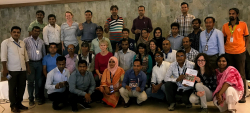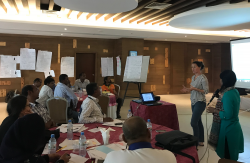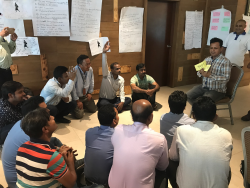INEE Capacity Development Workshop in Cox's Bazar, Bangladesh
Crises introduce a new set of complexities to the already challenging work of providing quality education for all. The humanitarian response around the Rohingya refugee crisis in Bangladesh is no exception. Fortunately, a range of expert government, non-governmental, and multilateral organizations are all working actively to ensure access to life-saving and life-sustaining services. With these various actors, however, come added inter-organizational coordination challenges.
 In emergency environments, organizations need not only be able to do this, but also to achieve the best possible outcomes for the communities they serve. Quality coordination enables organizations to agree on a common strategy and objective - in this case, to ensure that they are entitled to harmonize efforts and maximize reach. These efforts are fundamental to an effective education in emergencies response. However, co-ordination can be done much more often than not. When done right, cultures and languages, and political dynamics.
In emergency environments, organizations need not only be able to do this, but also to achieve the best possible outcomes for the communities they serve. Quality coordination enables organizations to agree on a common strategy and objective - in this case, to ensure that they are entitled to harmonize efforts and maximize reach. These efforts are fundamental to an effective education in emergencies response. However, co-ordination can be done much more often than not. When done right, cultures and languages, and political dynamics.
With over 14,000 members in over 170 countries, INEE functions by convening various stakeholders, providing collective action, providing members with the resources and supporting their work, and advocating and amplifying ideas and knowledge about education in emergencies. As a network, INEE's work is traditionally member-driven and coordinated by a small Secretariat. In March 2018, two Secretariat members - the INEE Minimum Standards Specialist, seconded by Plan International and the INEE Standards and Practice Coordinator - visited Cox's Bazaar, and were able to meet INEE members and organize a capacity building workshop. Highlights from this visit include the following:
Capacity Building Workshop in Cox's Bazar, Bangladesh

In line with INEE's key functions and with the Cox's Bazaar Education Sector's own assessments (see CXB Education Sector's Self-Assessment Capacity ), INEE's focus on the delivery of collaborative capacity building activities during its time in Bangladesh. A three-day INEE Capacity Development Workshop took place March 13-15, 2018, with the aim to empower members of their individual expertise while ensuring coherence across the sector. The trainings were planned, hosted, and co-facilitated alongside various members of the Education Sector, including UNICEF , Plan International , UNHCR , and BRAC. Nearly forty participants from across organizations shared knowledge about the crisis context, implementation challenges, funding needs, and best practices for effective education in emergencies. The INEE Minimum Standards for Education in Emergencies have been developed and used as a framework for training, with copies of the Contextualized Standards for Bangladesh distributed to all participants. Additional topics covered included the role of teachers and teacher, cognitive development of children, pedagogy and methodology, and peer coaching for teachers in crisis contexts.
Planning and Process
While such capacity development initiatives are much needed and vocally demanded, there are practical challenges to implementing them effectively in the midst of a response. INEE grappled with ensuring that the workshop content was relevant and appropriate for participants, as well as applicable to organizations’ work. The desperate situation in Bangladesh also presented special challenges in terms of aligning organizations with varied objectives, standard operating procedures, and accountability mechanisms. It is also important to acknowledge that INEE generally facilitates member-driven activities outside the scope of day-to-day response work. On the ground in Bangladesh, INEE leaned heavily on its mandate as an inter-agency network to respond to these challenges, emphasizing neutrality and harmonization for the sector as a whole to smooth over competing priorities and garner support for the “extra work” involved in capacity building.
Upon arrival in Cox's Bazar, INEE Secretariat members first participated in a series of Education Sector meetings and member consultations to inform planning. INEE then developed the training agenda in close cooperation with organizations working in the response, actively seeking inclusion and encouraging leadership from local, international and UN agencies alike. In terms of the training content, the INEE Minimum Standards were used as a framework to convey core concepts, introduce technical skills, illustrate contextualized examples, and stimulate brainstorming. This helped participants build capacity to use the Minimum Standards as a natural tool in implementation going forward. In addition, co-facilitators and participants from implementing organizations presented and discussed relevant themes and examples throughout the three-day training, so that participants could link their learning directly to the situation on the ground.

Participant Takeaways and Remaining Needs
Evaluation resources prepared by Plan International and INEE illustrated several key takeaways. Self-reporting by the 35+ participants indicated a strong feeling that the workshop content was relevant, and rated the training experience highly overall. Participants agreed they had built an improved understanding around the role and well-being of teachers, in particular.
Open-ended feedback resulted in two frequent requests from participants: for more, longer, and regularly available EiE trainings and for technically proficient simultaneous interpretation. The demand for additional and continuous sector-wide trainings taking place over 5-7 days (rather than 3 days) also speaks to a need for elaboration on the INEE Minimum Standards. The capacity in Cox’s Bazar differed greatly from the level of familiarity anticipated by INEE facilitators, and much of the content included in the INEE Harmonized Training Package modules remains to be unpacked. Future sessions on how the INEE Minimum Standards can be used as a tool in assessment, program development, curriculum development, implementation, monitoring and evaluation, and coordination of the education sector would be incredibly helpful for those who have now received this introductory training.
Furthermore, moving from one-off trainings toward sustainable capacity building that involves extended support and a variety of modalities (e.g. trainings of trainers, e-learning, or peer coaching and mentorship) should be a priority for the EiE sector as a whole. This is in line with what we know about good pedagogy and quality professional development, and is further highlighted by the feedback regarding translation and interpretation needs for this training.
Though simultaneous translation was provided for the sessions, this move towards accessibility was minimally helpful to participants because of the translator’s limited knowledge of EiE concepts and technical terminology. The sessions scored highest by the training participants were those co-facilitated entirely in Bangla by fellow local staff -- another indication that we should be doing more to meet practitioners where they are, and in the ways that are most comfortable and accessible to them.
Looking Forward
INEE’s experiences in Bangladesh affirm that the Minimum Standards are a key reference for harmonizing planning and capacity development during a response. We witnessed how the Minimum Standards -- a proven tool to achieve quality education in emergencies -- can be used to unite organizations in a shared language and vision. Organizations and individuals that participated in and helped lead the INEE Capacity Development Workshop returned to their own work with an agreed imperative to link program development and implementation back to the Minimum Standards. Actors across the global EiE sector can and should draw on the INEE Minimum Standards as an existing foundational resource to convene and harmonize diverse actors, even in the most challenging situations.
Building capacity using a minimum of all standards. By continually referring back to the priorities that we all share - the children, their best interests, and ensuring quality of education - the INEE. This shared foundation can be used to support the success of the crisis.
Co-Facilitation Experience
By Kinana Qaddour, BRAC
The INEE Capacity Development Workshop’s Pedagogy portion focused on shifting the perspective of pedagogy in the classroom to a student-centered, holistic approach.
Through training a diverse group including both teaching and programming perspectives, contextualized education provision can be a reality in this emergency education setting. The workshop emphasized “show rather than tell,” focusing on how to engage a multi-level and multi-language classroom through active instruction, strong classroom management, differentiation, and inclusivity.
The INEE Teachers in Crisis Context (TiCC) Training Pack paves the way for a standardized approach to professional development for learning facilitators. The TiCC Pack provides a set of an easy-to-use, in-depth tools for developing the technical skills of education implementers in addition to teachers. This is critical in contexts where a unified vision can help a number of actors implement programming that improves both teaching and learning.
The session was an opportunity to put the methods so often shared into practice, with an opportunity to try and learn in a setting where technical experts can provide guidance and feedback. This sets the stage for an exploratory and discovery approach to learning that implementers can then apply in learning centers to build the social, emotional, and academic skills of Rohingya children and teachers.



